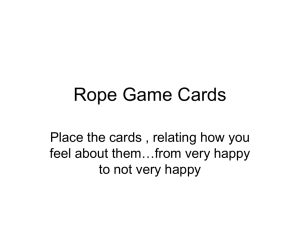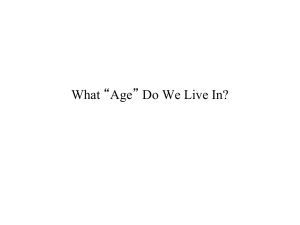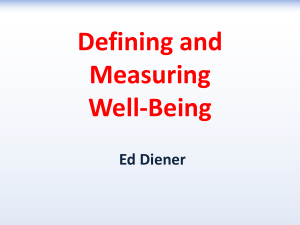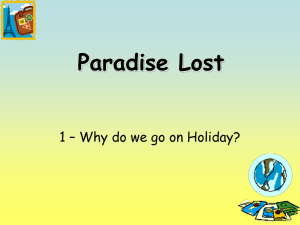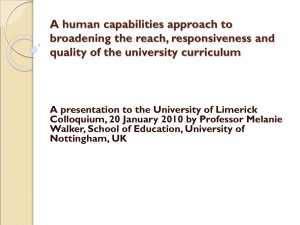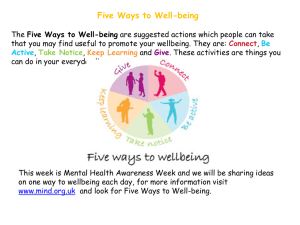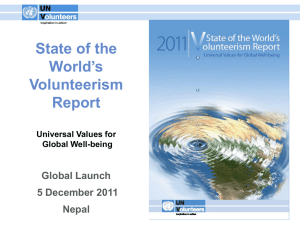Tourism, well-being and quality of life: exploring issues
advertisement
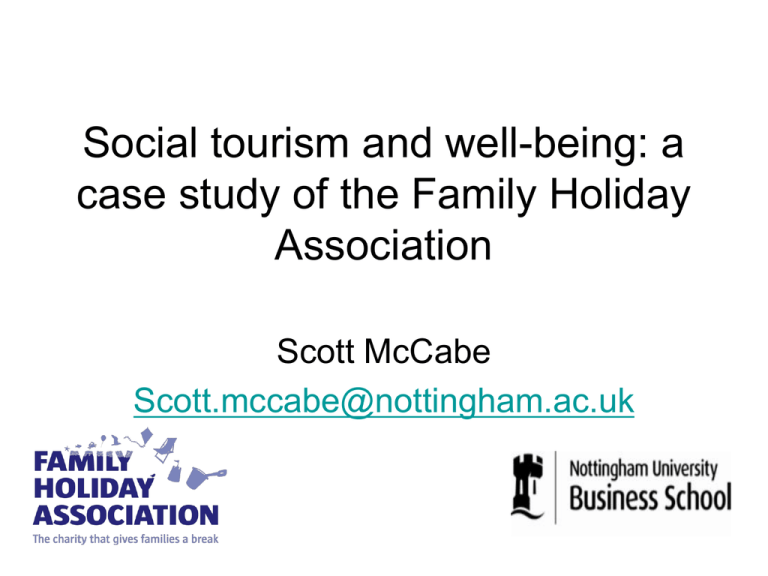
Social tourism and well-being: a case study of the Family Holiday Association Scott McCabe Scott.mccabe@nottingham.ac.uk Outline of the presentation • The KTP and the Family Holiday Association context • Subjective well-being/QOL/happiness – Conceptualisation and current developments • Subjective well-being research in tourism – Review of critical issues • Developing measures of subjective well-being – relating concepts to tourism • Methods and data – our approach to measuring wellbeing, outline of sample • Findings from the survey research – does wellbeing change after a holiday? – Can changes in wellbeing be linked to the holiday? – Links between social tourists and general population? • Concluding remarks Knowledge Transfer Partnership (KTP) between: Research Associate Sarah Johnson The University of Nottingham Dr Scott McCabe Family Holiday Association Thea Joldersma KTP aims and objectives • Increase the evidence surrounding social tourism in the UK • Raise the profile of social tourism in the UK • Increase awareness about the Family Holiday Association and increase donations to the charity • Create a more systematic evidence-based system of data collection for the Family Holiday Association • Undertake a large study of the benefits of social tourism Increase evidence/ Systematic data collection Online knowledge bank Experiential learning Application form Domestic Violence Feedback form Well-being research Increase the profile/awareness of social tourism and Family Holiday Association Subjective Well-being/QOL/Happiness ….muddy waters • Questions of life satisfaction, the overall quality of our lives, our sense of well-being, contentment with our lives, generally concern issues of what makes us happy. • Aristotelian sense of ‘living well’ – the good life (Ryff 1989). • Contented with life – ‘happy’ (Deiner 1984) • Seems simple, yet… • QOL is a ‘complex yet vague term and, thus, is very difficult to be defined’ (Iwasaki 2007: 234) • Genc (2012) identified over 100 definitions of QOL Life satisfaction • Life satisfaction is the ‘degree to which an individual judges the overall quality of his life-as-a-whole favourably’ (Veenhoven 1991: 7). • Global assessment (bottom-up spill-over theory) (Sirgy 2010) • Cognitive judgement based on affective (hedonic) and cognitive (contentment) aspects. QOL • “Individuals’ perception of their position in life in the context of their culture and value system and in relation to their goals, expectations, standards and concerns. It is a broad ranging concept affected in a complex way by the person’s physical health, psychological state, level of independence, social relationships, and their relationships to salient features of their environment.” (WHOQOL Group: 1997: 1). • Three main approaches outlined in a taxonomy of QOL definitions: – global assessments; – definitions which break the concept down into domains, and; – definitions that selectively break the concept into fewer component domains included in the other definitions (Farquar 1995) • Most often assessed through an assessment of satisfaction with a range of domains of life (Health, housing, education, work/employment, leisure, social life) • Objective and subjective measures overlap in some aspects. happiness • Most often measured by a variant of Bradburn’s (1969) affect balance scale • Presence of positive and absence of negative affect • Doesn’t help answer the cognitive components of SWB SWB • • • • • • Meaning in life – ‘authentic living’ – ‘human flourishing’ Well-being includes a eudaemonic component - consideration of whether the individual perceives an ability for personal growth and psychological strengths, a sense that they have the resources and skills to be able to meet their goals or maximise their potential (Deci and Ryan 2000). New Economics Foundation (nef) well-being: ‘gives people a sense of how their lives are going, through the interaction between their circumstances, activities and psychological resources’ (nef, 2009:18). Lower perceptions of meaning in life have been attributed to depression and anxiety, stress and the need for therapy. Positive meaning in life has been associated with enjoyment of work, happiness and life satisfaction (Steger et al 2006). A concern with individuals’ subjective experience of their own lives (Deiner and Suh 1997). Definitions often include: – global assessments of individual’s satisfaction with life, and – Affective components, and – indexes of positive functioning (Kahn and Juster 2002), and – consideration of their objective and subjective situations (pollard and Lee 2003). Issues? • "It's time we admitted that there's more to life than money and it's time we focused not just on GDP but on GWB – general wellbeing.“ (Cameron: 2010) • “If policy-makers are to make well-being a central objective they have to have ways of measuring it.” (Layard) • Trouble is there are many psychological scales • Often fail to take account of the multi-dimensionality of well-being – difficult to reduce it to single item measure. • Often translated as a measure of life-satisfaction, yet ‘There is more to life than satisfaction’ (nef 2009) QOL, happiness and SWB in tourism • Quality of Life – “Life satisfaction is functionally related to satisfaction within a number of individual life domains (e.g., personal health, work, family, love, money)…From the review of QOL studies in tourism and elsewhere, it is apparent that studies which analyze vacations as a domain separate from leisure are sparse. As a consequence, there is little knowledge about the specific contribution of vacations to QOL.” (Dolnicar et al 2012: 60). Sirgy (2010) ‘theory’ of leisure travel QOL relates goal theory to satisfaction with leisure travel and SWB. • Happiness - positive affect (happiness) is an expected outcome of vacations – yet there is limited knowledge on tourist’s affective states during/after a holiday. Happirness is linked to life satisfaction. Nawijn et al 2010 found some improvements in affect balance during the holiday, but quickly return to normal. De Bloom et al 2012 found holiday activities only weakly associated with improvements in health and well-being, but passive activities (savouring, relaxation and sleep) more strongly. • Subjective well-being – Gilbert and Abdullah (2004) remains most widely quoted study. SWB was measured by three separate components; positive affect, negative affect, life domains and life satisfaction. Well-being increased by a small amount after the holiday compared to the control group. Issues? • The three concepts are used synonymously and unproblematically (McCabe, Joldersma and Li 2010) • In a review of QOL definitions Bell (2005) identified 15 examples (not including SWB!) • Sirgy (2010) conceptual review of QOL uses SWB no fewer than 47 times to refer to QOL. • A need to standardise and harmonise concepts and measures • A need to ensure that vacations/tourism are included in standardised measures of well-being and/or QOL • For social tourists – a need to make the measures relevant, comprehensive but also manageable SWB scale • Life domains: 8 items (Health, income, accommodation, family, employment status, social life, amount of leisure time, way leisure time is spent) – Alpha .796 • Positive and negative affect: 4 items (nef) (time in the last week you were happy, enjoyed life. Time spent in the last week sad, depressed) – Eudaemonic well-being (psychological resources) (nef) • Social well-being (relationships): 6 items (how much time spent with family is enjoyable, stressful, how often do you meet socially with friends, colleagues, do you have people in life who care for you, discuss intimate matters with, how much time do you spend feeling lonely) – Alpha .782 • Satisfaction with life scale (SWLS): 5 items (in most ways life is close to ideal, conditions of life are excellent, I have the important things in life, if I could live my life over, I’d not change anything) – • Alpha: .861 Alpha: .488 • Positive functioning (resilience and self-esteem): 4 items (in general I feel very positive about myself, at times I feel like a failure, I’m always optimistic about my future, when things go wrong in my life, it generally takes a long time to get back to normal) – Alpha: .501 Research questions • Do SWB levels for social tourists change after a holiday? • Can the changes be attributed to the holiday? • Do circumstances affecting social tourists affect well-being? • What can we say about well-being of social tourists compared to other populations? Data collection/analysis • Two stage approach (pre and post holiday) • Conducted over the telephone • 168 pre surveys and 127 post surveys • Comparison of means (Wilcoxon Signed Rank Test) • Correlation of issues and SWB measures (Spearmans rho) • Comparison of postholiday well-being scores and results of postholiday evaluations. • Comparison of well-being of social tourists and other populations Sample characteristics Families affected by number of issues: 90 89% of respondents were women 80 70 Percentage 60 Average family size 50 40 30 4 20 10 0 Mental health Unemployment Debt Physical health Special needs Issues The average holiday length was 4 nights All families went on domestic holidays in the UK 41% had never been on holiday before Findings 1 - does wellbeing change after a holiday? Measures 6.06 Pre Standard Deviatio n 1.55 3.26 2.93 2.14 2.86 3.25 1.95 1.82 Amount of leisure time 8 Spend leisure time 2.50 3.06 1.68 1.70 2.99 3.47 1.95 1.84 1 3.66 4.07 2.25 1.96 Family time enjoyable 1 Family time stressful 2 Lonely 5.33 5.61 1.61 1.30 4.18 3.63 2.18 2.01 .92 .94 2 3.14 2.82 1.43 1.38 4 Family 5 Employment 6 Social life Pre Mean Post Mean Post Standard Deviation 1.35 5.76 7 Change nothing 2.05 7 1 8 9 1.88 1.72 3 7 • • Resilience Wilcoxon Signed Rank Test Asymp Sig0.00 Asymp Sig.0.00 Asymp Sig.0.00 Asymp Sig.0.00 Asymp Sig.0.00 Asymp Sig.0.01 Asymp Sig0.00 Asymp. Sig0.00 Asymp Sig0.01 Asymp Sig. 0.02 SWLS (0.013), life domains (0.001), and psychological resources had statistically significant changes in means. 10 areas of SWB measured that had statistically significant changes. Findings 2 - Can changes in wellbeing be linked to the holiday? 100 90 80 70 Impact of holiday on well-being domains 60 50 40 General wellbeing domains 30 20 10 0 Social life Leisure time Health Family time that is enjoyable Family relationships •77.1% of respondents reported moderate to extreme improvements in QOL due to the holiday • 8/10 respondents advised higher levels of happiness after the holiday • 68.9% of respondents reported higher levels of optimism because of the holiday Findings 3 – correlations between circumstances and well-being before and after a holiday Issues/Circumstances SWLS British Household Panel Survey Positive Affect Negative Affect Resilience and Selfesteem Relationships Gender -.036 .010 .053 .054 .047 -.127 Missing out -.054 -.137 .017 .038 -.060 .070 Relationship difficulties .048 -.017 .038 -.071 .026 -.054 Stress -.047 -.231* -.021 .013 -.057 0.24 Mental health .212* .199* .104 -.173 .188* -.058 Unemployment -.057 -.055 .198* .238* -.251* .105 Debt .007 .169 .076 -.018 .051 -.051 Physical health .063 .155 .114 -.110 .128 .046 Special needs -134 -.175 .051 -.160 .030 0.69 • Very low correlation of families issues/circumstance and SWB measures. Findings 4 - Links between social tourists and other populations Measure General population Social tourists Mean (standard deviation) Positive affect 2.90 (0.82) 2.19 (0.98) Negative affect 3.47(inv) (0.69) 2.85 (inv) (1.02) Health 5.14 (1.39) 4.48 (1.80) Income 4.74 (1.37) 3.17 (1.65) Accommodation 5.38 (1.29) 4.41 (1.93) Family 5.38 (1.29) 5.76 (1.55) Employment 6.18 (1.18) 2.10 (2.14) Social life 5.08 (1.38) 2.90 (1.96) Amount of leisure time 4.99 (1.33) 2.76 (1.69) Way spend leisure time 4.48 (1.48) 3.13 (1.95) Resilience and self-esteem Positive 3.85 (0.81) 3.14 (1.35) Failure 3.73 (1.07) 3.16 (1.29) Optimism 3.67 (0.94) 3.13 (1.37) Resilience 3.29 (1.05) 2.82 (1.38) 5.10 (5.10) 5.61 (1.30) 4.17 (1.58) 2.85 (1.39) Life domains Relationships Family time enjoyable Family time stressful Comparing scores of life domains and positive and negative affect respondents had much lower levels than general population scores. Concluding remarks • Holidays do have an effect on self-reported SWB amongst social tourists • Holidays impact on eudaemonia is interesting – worth exploring and comparing with mainstream tourists • Link between SWB and holiday taking offers insights into the role of tourism to individuals psychological states and to social life • Future opportunities to explore goals for tourism and well-being effects • Holidays should be included amongst measures of SWB and do contribute to leisure-related aspects of QOL (balance vs structure leisure [Dolnicar et al 2012]) • Well-being scales useful to compare amongst other vulnerable/disadvantaged groups and societal norms Thank you Questions?

